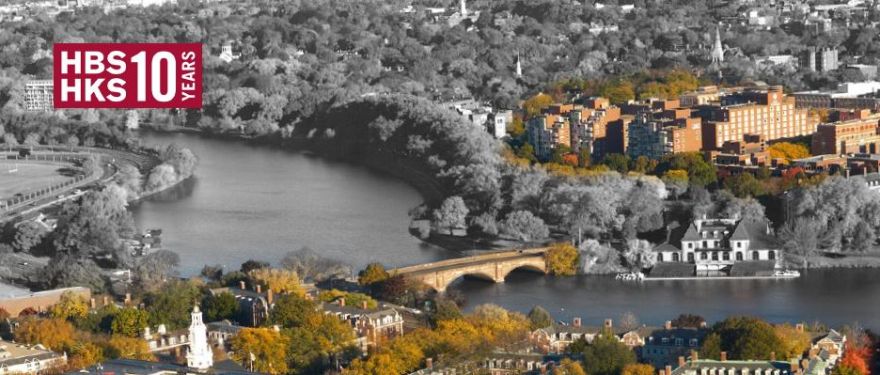Graduating more than ten HBS | HKS Joint Degree classes is an accomplishment in which all of us — students, alumni, faculty, and staff — can take considerable pride. The program’s mission of developing outstanding leaders who will contribute significantly to the well-being of society is an exceptionally important endeavor. It has been immensely fulfilling to lead and participate in this process, which makes it fully appropriate that we should pause to reflect on the trajectory that has brought us to this milestone.
The inception of the MBA/MPP and MBA/MPA-ID joint degree programs began with considerable uncertainly, when the two of us met to explore the basic, but by no means simple, question, “Is there a ‘There’ there?” And, “Would the whole be greater than the sum of the parts?” The answers were not obvious. Would there be demand for a joint degree program between Harvard Business School and Harvard Kennedy School? Would anyone show up? Why would they show up? How would we prepare students for graduation, and what would they do after graduating? What would be the joint degree program’s mission? Would the respective faculties support such a venture?
Though the answers were not obvious, several facts were. The business-government interface was growing larger and more important. Talented, “multilingual” leaders capable of fostering constructive interaction among business, government, and non-profit sectors were in limited supply and considerable demand. And our two Schools were blessed with deep pools of highly gifted, motivated students and faculty eager to make a difference in the world. If we couldn’t find purpose in a new joint degree program, define a meaningful mission, and chart a path to success, then something was amiss.
One meeting led to numerous others, embracing a larger group of faculty and senior staff from the two Schools. After nearly a year of effort, a proposal to approve the founding of the MBA/MPP and MBA/MPA-ID Programs emerged in late 2007 and was approved by the respective faculties in 2008. Its avowed mission was – and remains still: To develop outstanding leaders, skilled in management and the shaping of innovative public policy, who will assume positions of influence spanning business, government, and non-profit organizations, through which they will contribute significantly to the wellbeing of society.
Fourteen years later, the slender sprout that was planted in the midst of the Great Recession has given flower to a strikingly successful, robust program that sets the standard globally for joint degree programs integrating business management and public policy leadership. It is much more than the sum of two concurrent degree programs. For this, enormous thanks are owed to many faculty and staff, present and past, whose dedicated efforts made this growth possible. The generosity of David Rubenstein, Bill George, and others has been crucial in making Harvard’s joint degree programs and many of its cocurricular activities with the HKS Center for Public Leadership (CPL) accessible to the best and brightest students. The leadership of former CPL director David Gergen enabled the Joint Degree Program to work seamlessly with CPL’s activities.
What has powered the success of the Joint Degree Program is the tremendous investment of time, effort, and creativity that our students have made year after year. By 2011, the year we graduated our first class, students had founded the Joint Degree Leadership Council to serve as a student government and an exceptionally effective liaison to the Joint Degree Program’s Steering Committee.
Since then, there’s been no looking back. Student engagement has been inspired, and the Joint Degree Program has thrived. A broad array of annual student led activities forges a powerful sense of community and belonging among Harvard joint degree students. Regular student “pulse checks” undertaken by the JDLC and shared with faculty and staff drive continuous improvements. Vital and meaningful student support of our admissions and career development activities have provided Harvard with a genuine edge in these essential activities. The last decade has seen a number of important steps taken to advance the Joint Degree Program, but none have had more impact than the ownership and initiative for the Program’s success shown by the students themselves.
The world at large and the world of higher education have experienced tremendous stresses in the last fourteen years. We are fortunate the HBS | HKS Joint Degree Program, which was given birth in a tumultuous year, has thrived to reach this milestone year. Although it is impossible to predict what the next decade will hold for us, the ongoing commitment and collaboration of our students, alumni, faculty, staff, and benefactors – which have served us so well to date – ensure that these programs will continue to flourish. Together we are creating something meaningful and important, and “contributing significantly to the well-being of society.”
W. Carl Kester, HBS Faculty Chair
Robert N. Stavins, HKS Faculty Chair

